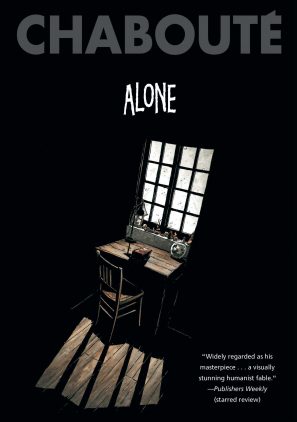Publisher: Galler 13/Simon and Schuster
Language: English (Translated from French by Ivanka Hahnenberger)
Format: Paperback
Publication Date:
List Price: $25.00 ($16.77 on Amazon)

There is a hidden beauty in Alone, inspired by Chabouté’s elaborate, yet simplistic drawings. These drawings encompass most of the book, as there is very little dialogue. What little dialogue there is still goes a very long way in creating the world that the story thrives through, and is amazing in its own right.
Alone is about a disfigured man who has been living in a lighthouse for all of his life, confined to the sea in what he calls a “stationary stone ship…a granite boat that doesn’t pitch… (227-28)” The man, who is simply referred to as “Alone” by the sailor who commonly delivers goods and provisions to his lighthouse, is accompanied by a lone goldfish and his imaginations of the world outside of his lighthouse, which is completely foreign to him, as he has never left his lighthouse. According to the sailor, his parents left Alone in the lighthouse because of his deformities. Regardless of that, Alone seems to live a fulfilling life, at least to his limited knowledge.
It isn’t until halfway through the book where we see Alone, and even then, it’s a silhouette or tiny peeks at him doing something in the lighthouse or fishing. When we do finally see the man, he isn’t as grotesque as it was made to be imagined at the beginning of the story. Alone is deformed, with one eyebrow bigger than the other and a massive overbite with patches of hair on his head, but the deformities are somewhat of an allegory to a matured naivete that makes up his character, someone who isn’t “properly formed” in the image that the world would have him be. He does appear to be content with his living situation, nonetheless.
That doesn’t necessarily stop him from wondering what is beyond the endless sea that encircles his lifetime home. Every night he takes his dictionary and drops it on his table to randomly select a word from the book. At first, it seemed somewhat random, however, as the story progresses there seems to be a correlation between the words that randomly pop up and the previous circumstances that Alone witnesses.
One such moment starts on page 198, where he witnesses a couple arguing. The man leaves the woman behind for a bit and she sits on the island reading a magazine. When the man comes back, she leaves without the magazine, and Alone goes to retrieve it once they’re gone. After looking through all of the stories and gossip, he takes his dictionary and drops it on the table. He randomly points out “voyage,” and as he does, he begins to lament about what is outside of what he has known as home.
Chabouté does an excellent job allegorizing the human curiosity through the eyes of Alone, as evidenced by the child-like fantasies that he experiences after picking a new word from the dictionary. Things like imagining hailing tennis balls for the word ‘metaphor,’ or a violin with actual holes and keys for the word ‘oboe’ characterize this in its entirety. It isn’t until they break from that at the end and Alone has the epiphany after viewing the second definition of ‘prison,’ that Chabouté really encompasses the human capacity for compassion and curiosity. While this is shown in glimpses through the eyes of the younger sailor, Alone’s action of releasing his fish from what he perceives as its own personal prison truly shines this in your face in a shocking, yet welcoming manner.
The simplicity of the choice of black and white color is a clear contradiction to the notions that Christophe Chabouté invites us to partake in. Things aren’t black and white in the world. While there is a lot of gray, there is a bit of color too, and in order to live your best life, you must expand your horizons in order to do just that. Alone isn’t a happily ever after kind of book. It’s a ” what’s next in my travels” kind of book and I don’t think I would have enjoyed it as much if it wasn’t.
Review Disclosure Statement: Alone was provided to us by Gallery 13/Simon and Schuster for review purposes. For more information on how we review video games and other media/technology, please go review our Review Guideline/Scoring Policy for more info.
Affiliate Link Disclosure: One or more of the links above contain affiliate links, which means at no additional cost to you, we may receive a commission should you click through and purchase the item.
Want more book reviews from The Outerhaven? Consider the following:
Meddling Kids Review
Goodnight Punpun Volume 6 Review
My Youth Romantic Comedy is Wrong, As I Expected Volume 1 Review
Summary
Christophe Chabouté is a masterful storyteller. Despite the limited dialogue, Alone doesn’t struggle to tell a good story while teaching a very valuable lesson. As someone who doesn’t read a lot of graphic novels or manga from outside of the United States and Japan, I can easily recommend Alone to anyone looking for a story about a not-so-black and white approach to life.
-
Witty sentence here and the score. remember to use the star system!

